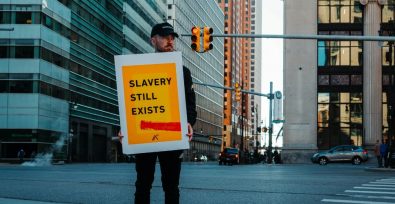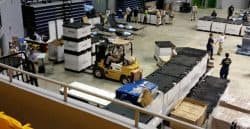In recent years, Australia’s Pacific Australia Labour Mobility (PALM) scheme has faced growing scrutiny amid serious allegations of modern slavery. According to an article by SBS News, more than 7,000 workers have exited the scheme over the past five years, citing poor working conditions, abuse, exploitation, and even fatalities.
In response to rising concerns, New South Wales (NSW) launched a parliamentary inquiry last year to examine the risks and prevalence of modern slavery in rural areas—including forced labor, violence, sexual servitude, labor trafficking, and wage violations. Additionally, the Australian government under Prime Minister Anthony Albanese has introduced a series of reforms.
But a core vulnerability remains—PALM workers are tied to a single employer and cannot change employers without formal approval.
“my hands hurt”
In 2022, Rayasi was offered a four-year contract at a meat factory in Melbourne. After months of trying to enter the PALM scheme, she felt deeply grateful for the opportunity. The job promised to pay five times more than her previous job. She planned to use the money to support her family back home in Fiji.
Rayasi quickly discovered that her orientation did not adequately prepare her for the job. She recalled:
“When I saw the whole factory, I was scared. The smell, the gas. It’s a totally new environment for me.”
The employer assigned Rayasi to a section of the factory where she had to gut cow stomachs while high-heat steam killed bacteria. Within weeks, she developed occupational hand dermatitis and went on sick leave. Believing the work environment was worsening her condition, she requested a transfer. Her request was denied.
Even six months later, when the pain in her right hand became excruciating, her employer refused to move her. She said:
“I told them I can’t keep doing this, my hands hurt. I’ve got a medical certificate.”
Over the next seven months, she sought help from the Australasian Meat Industry Employees Union, but it was futile. Her labor hire company advised her to apply for workers compensation, but she saw it as a band-aid solution and declined. She also tried asking her manager to move her to another PALM-sponsored job. But her request was met with threats of deportation.
Eventually, Rayasi abandoned her job—losing her valid visa status and access to private medical care.
Not an isolated incident
PALM workers’ visas are tied to a single employer, making them especially vulnerable to abuse. The Immigration Advice and Rights Centre has received reports from PALM workers who sustained serious workplace injuries but were too afraid to seek medical attention.
Joshua Strutt, lawyer and the chief executive of the Immigration Advice and Rights Centre said:
“There’s this really huge power imbalance that exists through this system that needs to be fixed,”
Reported by SBS news, Woolworths, one of Australia’s largest supermarket chains, recently cut ties with a labor hire company after discovering migrant workers in its Queensland supply chain were living in appalling, unlivable conditions. Workers raised concerns, but the company ignored them. Authorities later removed the company from migrant worker schemes, but reports say it has since tried to operate in other states.
Each year, Woolworths conducts around 1,000 audits across its supply chains, uncovering thousands of compliance issues—from fire hazards to wage theft. Housing also raises serious concerns. In some cases, employers cram up to 10 workers into a single house, charging as much as $170 per bed.
Even while enduring these exploitative conditions, many workers told SBS News they stay silent out of fear—worried they’ll bring shame to their community or be seen as undermining the scheme.
A core vulnerability remains
Even those who remain in the PALM scheme face barriers. Many workers struggle to navigate Australia’s digital healthcare system, even though they have private health insurance. In response, the federal government announced in March that PALM workers would receive training in language, literacy, numeracy, and digital skills through the Skills for Education and Employment (SEE) program.
Some participating countries deploy liaison officers to help PALM workers resolve issues locally. However, some workers have reported that they received no clear guidance on how to re-enter the scheme. During the months that Rayasi waited for assistance, she saw many workers deported by the Department of Home Affairs based on reports of “disengagement” from their employers.
The visa condition that ties workers to a single employer has left many too afraid to contact the Department of Employment and Workplace Relations (DEWR) for help. Those who leave their jobs without formal approval face an impossible choice: return home empty-handed or remain in Australia without legal status or access to healthcare—leaving them exposed to other forms of exploitation.
As Joshua Strutt put it:
“PALM visa holders are one of the most exploited temporary visa holders in Australia,”
Now in Queensland, Rayasi says she is grateful to be working again under the scheme with a new employer.
Rayasi hopes others like her will also get a second chance.








Freedom United is interested in hearing from our community and welcomes relevant, informed comments, advice, and insights that advance the conversation around our campaigns and advocacy. We value inclusivity and respect within our community. To be approved, your comments should be civil.
Consumers should ask themselves questions about a cheap product they are about to buy, each time, and make better choices.
In the Netherlands, too, this is going on. People from other EU countries and also from South America get lured here with the promises of work and good pay. They end up being exploited horribly and usually homeless without income, unable to go home and Dutch municipalities refusing to support them in any way (even though they usually are obliged to). It’s a disgrace.
As a proud Australian I am deeply concerned this can and is happening here. We must take the necessary actions/ legislations to stop this now and prevent it happening again.
we believe you love the answer